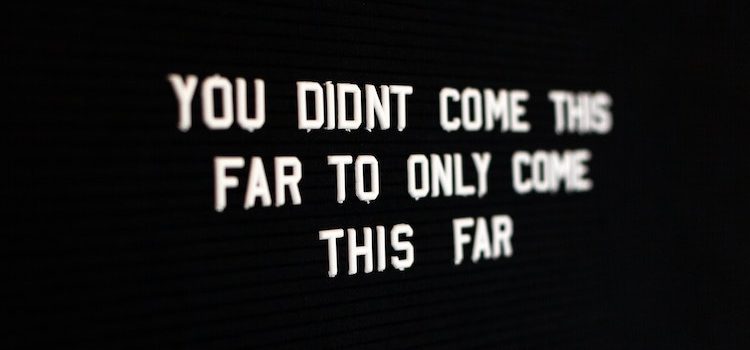

This article gives you a glimpse of what you can learn with Shortform. Shortform has the world’s best guides to 1000+ nonfiction books, plus other resources to help you accelerate your learning.
Want to learn faster and get smarter? Sign up for a free trial here .
How can you keep working towards your goals when the going gets tough? How do you keep persevering and resist the temptation to give up?
The road to your goals can be long and arduous. When you’re working towards an ambitious goal, it’s all too easy to become so consumed by the daily grind that you lose the motivation to keep going. To keep the course and avoid falling off track, you need to develop two virtues: perseverance and determination.
Below are six strategies to help you persevere so you can step up, face the obstacles, and keep going.
The Importance of Perseverance and Determination
Most people would agree that our cards in life aren’t dealt equally and fairly: We’re born with different capabilities, talents, and intelligence. While it’s true that, to some extent, your potential in life is limited by your innate talents and intelligence, there are other factors at play that can help you get ahead in life. No matter how intelligent and talented you are, with hard work, perseverance and determination, you can achieve anything you set your mind to.
Here are some strategies to boost your perseverance.
Reconnect With Your “Why”
In his book Goals!, Brian Tracy says that one way to keep up your perseverance and determination is to regularly reconnect with the “why” behind your goal. To this end, try listing all the reasons you decided to pursue the goal you’re trying to achieve. Write as many reasons as you can think of—having more reasons increases your motivation, perseverance, and determination.
For example, if your goal is to lose 30 pounds, one of your reasons might be “to feel comfortable in a swimsuit next summer.” However, you might delay taking action if the summer is still months away. Having other reasons such as “to have more energy,” “to stop taking medication,” and “to improve my sex life” can increase your motivation and get you moving.
Surround Yourself With Reminders of Your Goals
According to Benjamin Hardy, the author of Personality Isn’t Permanent, the best way to stay focused on your goal is to have small, frequent reminders of your optimal future in your immediate environment. This translates to more motivation and self-control. Thus, it makes it easier to continue living your new lifestyle and prevents you from lapsing into your old patterns. A reminder could be a certain book that’s always on your nightstand or getting a tattoo related to a commitment you’ve made.
An additional way to keep your goals top of mind is to make commitments that change the environments you’ll be in on an ongoing basis. For instance, enrolling in therapy and joining a sports team are commitments that involve regularly spending time in new environments. When you commit to spending time in environments that help you reach your goals—for example by helping you become more fit or attain new skills—the environments themselves can help stay determined to keep going.
Surround Yourself With Supportive People
As you work towards your goals, you’ll sometimes feel tempted to give up or take the easy route. To avoid falling off the track, surround yourself with people who will make sure you stay the course and continue giving everything you have—people who understand what success requires and who will hold you accountable to that standard. This accountability means recognizing where you can put more effort in and pushing you to do so.
Jack Canfield, the author of Success Principles, recommends creating three categories of supporters, each fulfilling a different role:
- Achievement group: Make an achievement group of five or six people and meet with them to discuss how you’ll accomplish your goals. This group can be personal or professional, and can relate or not relate to your field—what’s important is that everybody works towards a shared purpose and provides each other with new perspectives and resources.
- Accountability partner: Have one accountability partner, and meet regularly with them to make sure you’re both doing the work necessary to reach your goals.
- Support team: A support team consists of experts dedicated to helping you excel in your field. Meet with members of your support team regularly in a one-on-one setting.
TITLE: The Success Principles
AUTHOR: Jack Canfield
TIME: 90
READS: 118.1
IMG_URL: https://www.shortform.com/blog/wp-content/uploads/2020/11/the-success-principles-cover.png
BOOK_SUMMARYURL: the-success-principles-summary-jack-canfield
AMZN_ID: XYZ
Embrace Failure
Fear of failure is worry about foreseen consequences of not succeeding at our goals. Research shows that the consequences of failure that we fear most are embarrassment, inadequacy, being stuck, becoming irrelevant, and suffering material losses.
One of the potential results of fearing failure is that it can cause you to stop persevering and give up on your goals when the going gets tough. This is because if you give up, you don’t fail, sparing yourself the aforementioned consequences. One psychologist describes this negative effect as a low-risk, low-reward life. Living this way limits our potential achievements and happiness. Further consequences of fearing failure include negative physical and mental symptoms like fatigue and dissatisfaction with life.
In his book Discipline Equals Freedom, Jocko Willink offers a solution to overcoming a fear of failure: fear stagnation more than failure. Imagine in days, weeks, or years from now, being no closer to your goal and let the fear of all of this wasted time and potential spur you into action.
Building on Willink’s solution to fear stagnation more than failure, consider using this “time travel” thought exercise to remedy your fear of failure. With this exercise, you’ll imagine the future consequences of your actions now to make better decisions for your future self.
Practice Negative Visualization
Visualization is a powerful tool for helping you keep up the motivation to achieve your goals.
However, most people do it wrong: They visualize the future in which they have achieved their goal. According to Ryan Holiday, the author of Ego Is the Enemy, you should visualize the future where you’ve failed.
Researchers examining the effects of visualization on goal achievement have found that when subjects used positive visualization techniques for a goal they wanted to accomplish, they lost energy to persevere toward their goal and were less likely to achieve it.
In contrast, subjects who either visualized negative things or thought about the possibility that they might not achieve their goal had higher energy and accomplished more afterward.
The researchers hypothesized that visualizing a positive outcome had a relaxing effect on the body (one way they measured their subjects’ reactions was by tracking their systolic blood pressure, a useful proxy for either relaxation or anxiety). For this reason, psychologists sometimes use positive visualization techniques to help anxious patients relax. However, if your goal is to accomplish something that requires perseverance and determination, such relaxation techniques can be counterproductive.
TITLE: Ego Is the Enemy
AUTHOR: Ryan Holiday
TIME: 49
READS: 144.5
IMG_URL: https://www.shortform.com/blog/wp-content/uploads/2021/05/ego-is-the-enemy-cover.png
BOOK_SUMMARYURL: ego-is-the-enemy-summary-ryan-holiday
AMZN_ID: XYZ
Final Words
While desire and ambition can help you start reaching for your goals, perseverance and determination will keep you going, despite the obstacles. Challenges are inevitable, and even the most successful people have had their fair share of setbacks. The reason they’re successful isn’t their luck or exceptional talent but their unyielding determination and the ability to persevere despite difficulties.
If you enjoyed our article about perseverance and determination, check out the following suggestions for further reading:
A cult classic among professional athletes, The Obstacle Is the Way is a guidebook to solving any problem preventing you from achieving ambitious goals. It’s based on the tenets of Stoicism—an ancient Greek philosophy promoting calm rationality in any situation. Ryan Holiday argues that by choosing to view your obstacles in an empowering way, you can turn them into your greatest assets.
Many successful leaders and businesspeople are lauded as “great geniuses,” but psychologist Angela Duckworth argues that talent and intelligence matter less to success than grit: the personality trait behind hard work, perseverance and determination. In Grit, she explores what grit is, where it comes from, how it drives success, and how you can develop it.

Want to fast-track your learning? With Shortform, you’ll gain insights you won't find anywhere else .
Here's what you’ll get when you sign up for Shortform :
- Complicated ideas explained in simple and concise ways
- Smart analysis that connects what you’re reading to other key concepts
- Writing with zero fluff because we know how important your time is






